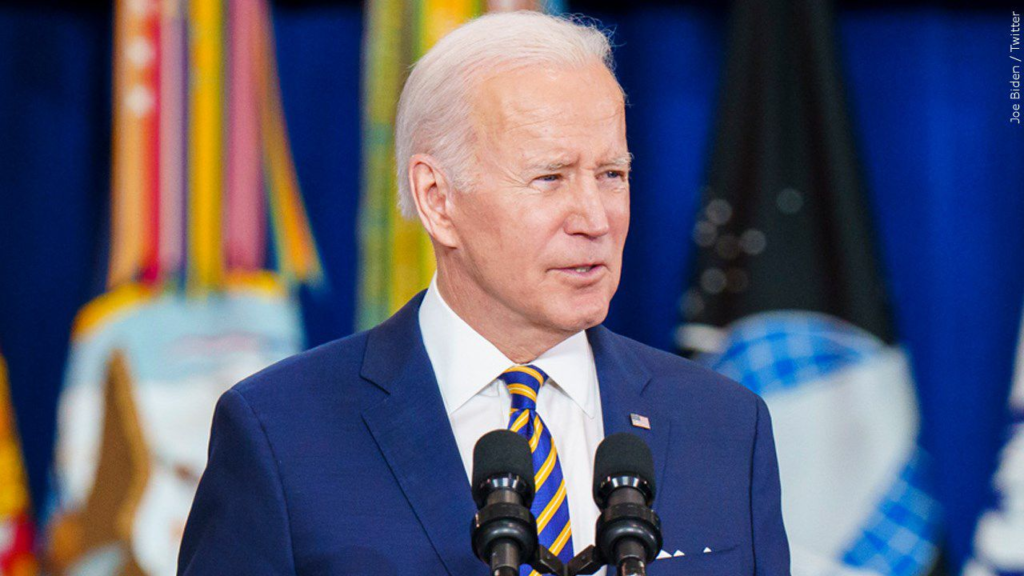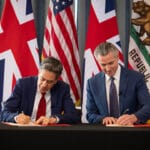Biden to announce new initiatives on curbing methane, zero-emissions vehicles at Major Economies Forum

President Joe Biden will announce several new initiatives Friday morning as he hosts the Major Economies Forum on Energy and Climate, according to senior administration officials. It is the largest climate meeting of world leaders in the run-up to the United Nations climate summit, COP27, in November.
Twenty-three of the world’s largest economies will be represented at the virtual meeting, as well as other countries participating in climate pledges, officials said. Several foreign nations are expected to announce strengthened climate targets in line with the Paris agreement.
The US and European Union will launch the next step of their global methane pledge to reduce emissions of the planet-warming gas by 30% by 2030. The so-called energy pathway, the officials said, will focus on eliminating routine flaring in fossil fuel operations and focus on ways to cut methane pollution in the oil and gas sector.
Methane is a potent greenhouse gas that’s around 80 times more powerful than carbon dioxide in the short term. Climate scientists say reducing methane emissions is a necessary but easy way to begin turning down the dial on the climate crisis.
Biden will also announce a new global initiative focused on raising $90 billion to develop and scale new clean technologies to decarbonize, officials said. The US will devote $21.5 billion to this effort, with funds already passed in Biden’s bipartisan infrastructure law.
The US will also invite other countries to join the president’s previously announced domestic goal that by 2030, half of vehicles sold in the US will be battery electric, fuel-cell electric or plug-in hybrid, officials said. Biden’s zero-emissions vehicles target is not binding and some other countries are moving more aggressively on it. For instance, the European Union is considering its own more stringent standards to ban the sale of new combustion engine cars by 2035.
Senior administration officials said that Friday’s meeting is a chance for the world’s major economies to reiterate their climate commitment amid the turmoil brought by Russia’s invasion of Ukraine.
“These actions are all the more urgent following Russia’s further invasion of Ukraine, which has disrupted energy prices, strained economies with rising prices, and threatened vulnerable communities with severe food shortages,” a senior administration official said.
Countries participating in Friday’s meeting include China, Australia, the European Union, the United Kingdom, Japan, Indonesia, Saudi Arabia and Egypt — which will host COP27 in November.
Chinese President Xi Jinping will not attend the meeting; China will instead be represented by its climate envoy Xie Zhenhua, officials said.
Another senior administration official said Zhenhua and US Climate Envoy John Kerry have met multiple times in the last month and continued work on the agreement the two countries announced at COP26 in Glasgow last year is “intensifying” and a “top priority.”
“We are committed to working with them on topics like their plan to address methane emissions in China for the first time,” that official said. “We’re also of course engaging on other topics including the energy transition and illegal deforestation in China.”
See related article: President Biden, U.S. Department of Transportation Open Applications for First Round of Funding from the Bipartisan Infrastructure Law’s New Competitive Bridge Investment Program
The US faces a steep path to hitting its own emissions target
As promising as Biden’s early goals on reducing US greenhouse gas emissions were, progress on achieving them has been mixed, independent analysis shows.
After rejoining the Paris accord after taking office, Biden announced a goal to slash US emissions in half from 2005 levels — a record-high year for planet-warming emissions — by 2030.
In order to do that, the nonpartisan research firm Rhodium Group found that three major things would have to happen: Biden would have to pass massive investments in clean energy through Congress, enact several ambitious federal regulations cutting emissions from things like vehicles, power plants and industry, and states would have to make significant progress.
On Thursday, Rhodium released a progress report showing little progress has been made, and the window to act is rapidly closing.
Rhodium Group partner John Larsen told CNN that the things Biden has able to get done so far — including passing his bipartisan infrastructure bill and getting through some government regulations — is still nibbling around the edges of his Paris commitment.
“The big-ticket items are all either in a holding pattern or at very early stages,” Larsen told CNN.
The biggest item left undone is a climate and clean energy package passing through Congress. Talks between West Virgina Sen. Joe Manchin and Senate Majority Leader Chuck Schumer on a limited spending package that likely will include clean energy tax credits are continuing — but so far it’s unclear if they will produce a deal.
The timeline to pass any such legislation is extremely narrow, as Democrats risk losing their majority in November.
Larsen said Biden’s Environmental Protection Agency has several regulations either in the works or yet to start that could make a dent. But even that has roadblocks.
Another barrier to progress has been the looming Supreme Court decision on EPA’s authority to regulate greenhouse gas emissions from power plants, which could limit the tools the administration has to cut down planet-warming gases in the electricity sector.
“When [White House national climate adviser] Gina McCarthy says the federal government has all the tools to get to the target, it’s almost certainly the case that they do,” Larsen said. “But how they use these tools and how ambitious they choose to be will almost certainly be influenced by whether there’s legislation in place.”












